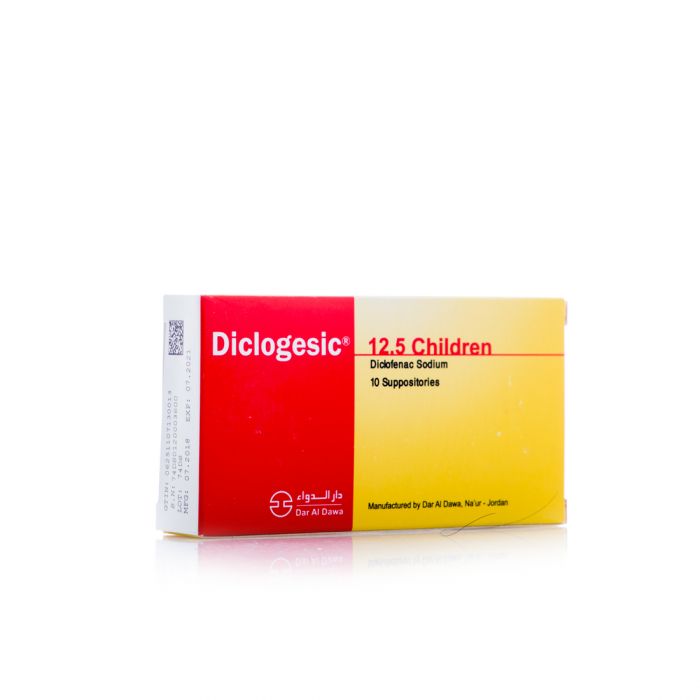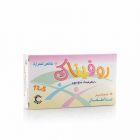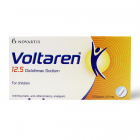Diclogesic, Analgesic, Antipyretic & Anti-Inflammatory - 10 Suppository
Collect 1 Arbahi Points with this purchase | Silver
you can buy using 102 Arbahy points
Buy with 23 pts of Qitaf
Product Name
- Diclogesic, Suppository, Analgesic, Antipyretic & Anti-Inflammatory - 10 Suppositoryy
Scientific Name
- Diclofenac Sodium 12.5 Mg Suppository
Category Of Diclogesic Suppository
- Analgesic, Antipyretic & Anti-inflammatory
Mechanism Of Action Of diclofenac
- Diclofenac which belongs to a group of medicines called non-steroidal anti-inflammatory drugs (NSAIDs) which works by
- Inhibits cyclooxygenase (COX)-1 and COX-2, thereby inhibiting prostaglandin synthesis
- May also inhibit neutrophil aggregation/activation, inhibit chemotaxis, decrease proinflammatory cytokine level, and alter lymphocyte activity
Therapeutic Indications Of Diclogesic Suppository
- relieve pain, reduce swelling and ease inflammation in conditions affecting the joints, muscles and tendons
- Management of fever
- treat pain and inflammation associated with dental and minor surgery
- Inflammation of the bones and joints such as rheumatoid arthritis, osteoarthritis, acute gout and ankylosing spondylitis.
- Back pain.
- Sprains, strains, sports injuries, dislocations and fractures.
- Conditions affecting the tendons such as tendonitis.
Method Of Administration Of Diclogesic Suppository
- Suppositories are designed for insertion into the back passage (rectum). Never take them by mouth.
- How to use:
- Lie on one side with your knees pulled up towards your chest.
- Gently push the suppository pointed end first into your back passage (rectum) with your finger.
- Push the suppository in as far as possible
- Lower your legs and, if possible, stay still for a few minutes.
- If you feel as if you need to push the suppository out, try to resist this by lying still with your buttocks pressed together.
- It is important to keep the suppository in the rectum to allow it to melt and the medicine to be absorbed.
- Pushing the suppository high into the rectum with your finger will help to reduce this feeling.
- Wash your hands.
- Consult your physician or pharmacist if your child age between 1 – 3-year old before using
- For children older than 1 year of age, the dose is 1-3 mg/kg/day divided into 2 or 3 doses.
- Doses may be changed in special conditions so always follow your doctor's or pharmacist's instructions.
- If you take more than you should, talk to a doctor or go to the hospital straight away.
- If you forget to take a dose, take it as soon as you remember it unless it is nearly time for your next dose.
- Do not take a double dose (two doses at the same time) to make up for the forgotten dose.
Undesirable Side Effects Of Diclogesic Suppository
- Stomach pain, heartburn, nausea, vomiting, diarrhea, indigestion, wind, loss of appetite
- Headache, dizziness, vertigo
- Skin rash or spots
- Raised levels of liver enzymes in the blood
- Irritation where the suppository is inserted
Pregnancy & Breastfeeding Precautions While Taking Diclogesic Suppository
- If you are pregnant or breastfeeding, think you may be pregnant or are planning to have a baby, ask your doctor or pharmacist for advice before taking this medicine.
- Not preferred especially during the first 3 months
Non-Pharmacological Treatments & Advice To Reduce Pain
- A lot of people find relief from gentle massage, and some hospice agencies have volunteers who are trained in massage therapy.
- Relaxation techniques.
- Physical therapy
- Pet therapy
- Gel packs.
Warnings & Special Precautions while Taking Diclogesic Suppository
- Suppositories may also occasionally cause itching or burning in your back passage.
- Stop taking the medication and tell your doctor straight away if you notice:
- Sudden and crushing chest pain (signs of myocardial infarction or heart attack)
- Breathlessness, difficulty breathing when lying down, swelling of the feet or legs (signs of heart failure)
- Sudden weakness or numbness in the face, arm or leg especially on one side of the body.
- sudden loss or disturbance of vision; sudden difficulty in speaking or ability to understand speech; sudden migraine-like headaches which happen for the first time, with or without disturbed vision. These symptoms can be an early sign of a stroke.
- Stomach pain, indigestion, heartburn, wind, nausea (feeling sick) or vomiting (being sick)
- Any sign of bleeding in the stomach or intestine, for example, when emptying your bowels,
- blood in vomit or black, tarry feces
- Allergic reactions can include skin rash, itching, bruising, painful red areas, peeling or blistering
- Tell your doctor or pharmacist if you are taking any of the following:
- Medicines to treat diabetes
- Anticoagulants (blood-thinning tablets like warfarin)
- Diuretics (water tablets)
- Lithium (used to treat some mental problems)
- Methotrexate (for some inflammatory diseases and some cancers)
- Ciclosporin and tacrolimus (used to treat some inflammatory diseases and after transplants)
- Trimethoprim (a medicine used to prevent or treat urinary tract infections)
- Quinolone antibiotics (for infections)
- Any other NSAID or COX-2 (cyclo-oxygenase-2) inhibitor, for example, aspirin or ibuprofen
- Cardiac glycosides (for example digoxin), used to treat heart problems
- Medicines known as SSRIs used to treat depression
- Oral steroids (an anti-inflammatory drug)
- Medicines used to treat heart conditions or high blood pressure, for example beta blockers or ACE inhibitors
- Voriconazole (a medicine used to treat fungal infections)
- Phenytoin (a medicine used to treat seizures)
- Colestipol/cholestyramine (used to lower cholesterol)
Storage Conditions Of Diclogesic Suppository
- store below 25°c
- Keep this medicine out of the sight and reach of children.
- Store in the original package to protect from moisture.
- Do not use this medicine after the expiry date which is stated on the box/blisters/label. The expiry date refers to the last day of the month.
For More Information About diclofenac
- Ask your physician or pharmacist
- Visit SFDA website
- Visit Medscape at Information About Diclofenac
- Visit Drugbank at Information About Diclofenac
- Visit Drugs.com at Information About Diclofenac
| Size | 10 supps |
|---|---|
| Is Bonded | No |
| Bonded Types | None |
| Product Form | Suppository |



